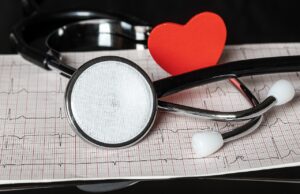
Here we are once again, right in the midst of the holiday season.
Every year, it’s the same marathon: work demands, frantic last-minute gift shopping, the whims of Mother Nature, and of course, countless celebrations.
Just thinking about it can take your breath away! But how is your heart holding up through it all?

A Spike in Heart Attacks and Strokes
Did you know that in North America, the holiday season is associated with a marked increase in heart attacks, cardiac-related deaths, and strokes?
Statistics reveal nearly a 10% rise in these events. This is far from trivial!
A Proven Connection
Studies conducted in regions with temperate climates confirm that this surge in severe cardiac events is closely tied to the Christmas and New Year period.
These findings highlight the impact of the holidays, with their stress, indulgences, and disruptions to routine, on cardiovascular health.
Will You Make It to Christmas Along With Everyone Else?
The holiday season feels a bit like a funnel: everything seems to converge into those few days at the end of the year.
Work piles up, everything seems urgent, and stress reaches its peak, both physically and emotionally. There’s more travel, often on icy roads. Overeating, drinking too much, and abandoning physical activity become common. The result? Our health, especially our heart, can suffer.

And Mother Nature Joins In
The enchanting snowy scenes on holiday cards don’t always reflect reality.
Bitter cold and snowstorms make traveling more difficult and add extra stress to an already hectic time of year.

And in Canada, the Cold Sets In
Older Canadians are particularly vulnerable to the harshness of winter. Intense cold can cause an increase in bloodBlood is composed of red blood cells, white blood cells, platelets, and plasma. Red blood cells are responsible for transporting oxygen and carbon dioxide. White blood cells make up our immune defense system. Platelets contribute to blood pressure, raising the risk of cardiovascular diseases and strokes.
This phenomenon is well-documented and serves as a reminder of the importance of taking extra precautions to protect heart health during the cold season.
A Risky Period: December 25 to January 7
Surprisingly, this phenomenon isn’t limited to regions with harsh winters. An Australian study conducted in New Zealand, where Christmas is celebrated in the middle of summer, revealed an increase in heart attacks between December 25 and January 7.
This observation, noted from 1988 to 2013, aligns with data from the United States and Great Britain, which also report a rise in cardiovascular deaths during this festive time.

Why Is This Period So Risky?
Several factors contribute to the heightened risks during the holidays:
- The stress of preparations, family gatherings, and work deadlines takes a significant toll on the body.
- Overindulgence in food and alcohol can overwork the heart and trigger cardiovascular issues.
- Exhausting and stressful travel can exacerbate the situation.
- Reluctance to seek medical help, as many people delay visits to healthcare facilities when away from their usual providers.
Being Away Is No Excuse
This time of year, while filled with joy and togetherness, can also take a toll on your health. Let’s not forget: illness doesn’t take a holiday, even during festive celebrations.
It’s crucial not to downplay certain symptoms. No matter where you are, healthcare professionals are available to assist you. If you experience concerning symptoms, don’t hesitate to seek medical attention. A preventive approach is often the best way to safeguard your health and that of your loved ones.

The Secret Lies in Prevention
It’s possible to reduce the heightened risk of cardiovascular diseases during the holiday season.
The key is moderation and maintaining healthy habits, even amidst the festivities.
Stress-Free Shopping
Simplify your gift shopping with gift cards—an easy solution that avoids the hassle of choosing the right size, color, or fit. Online shopping is another great way to steer clear of crowds.
If you enjoy the lively atmosphere of stores during the holidays, take your time and be sure to pause for breaks to recharge.
For Sweet Tooth Enthusiasts
With sugary treats everywhere this time of year, it’s important to indulge in moderation. Aim to maintain a balanced diet by incorporating variety and mindful choices in your meals.

Don’t Leave on an Empty Stomach
Before heading to a gathering, have a protein-rich snack. This will help you manage your appetite better and resist overindulging in tempting dishes on-site.
Additionally, this precaution is particularly effective in minimizing the negative effects of alcohol when consumed on an empty stomach.
By following these tips, you can enjoy the festivities while safeguarding your health and heart.
What about Alcohol
Recent studies have highlighted the impact of alcohol on cardiovascular health, even when consumed in small quantities. While an occasional exception may seem harmless, it’s important to make informed and responsible choices.
Moderation remains key, both for preserving your health and enjoying holiday pleasures without excess. Remember to hydrate regularly between drinks, which will help mitigate unpleasant aftereffects and maintain your overall well-being.

I Overate!
Who hasn’t left the table exclaiming, “I overate!”? This feeling of discomfort is unpleasant and, more importantly, digestion places an extra strain on the heart. Once again, moderation is your ally.
Take Time for Yourself
Give yourself moments of rest. Whether it’s a nap, meditation, or reading, these breaks are essential for relaxation and recovery. It’s also beneficial to aim for 8 hours of sleep each night to fully recharge your energy.
Get Moving and Enjoy Fresh Air!
Physical activity remains a cornerstone of cardiovascular prevention. A daily walk or engaging in your favorite sports can work wonders. Take advantage of the fresh air and keep your body moving—your heart will thank you.

Be Mindful of Those Around You
The holiday season isn’t joyful for everyone. Take care of those around you—your attention can make a big difference.
Also, be vigilant for any signs of cardiac distress. Remember that symptoms of a heart attack can vary from person to person but often include:
- Significant and persistent chest pain lasting more than 30 minutes;
- Nausea, vomiting, shortness of breath, cold sweats, or a feeling of weakness;
- Pain radiating to the left or right arm, jaw, or back.
Sometimes, these symptoms may be mistaken for severe indigestion.

Don’t Take Risks
If in doubt, call 811 for medical advice. And if an emergency is suspected, don’t wait—call 911 immediately.
Your quick response could save a life.
Take Care of Yourself… and Your Heart During This Festive Season!
Happy Holidays!










